MOSCOW (AP) — Worshippers including President Vladimir Putin packed Moscow’s landmark Christ the Savior Cathedral for a nighttime Easter service led by Patriarch Kirill, head of the Russian Orthodox Church and an outspoken supporter of the Kremlin.
The traditional sung service begun late Saturday, with Kirill delivering well-wishes to Orthodox believers which were broadcast on Russian TV. A procession of white-robed clergy then circled the vast cathedral, rebuilt in post-Soviet times and widely seen as symbolic of Russia’s rejection of its atheist past, as they swung smoking incense censers and chanted the liturgy.
Click to Gallery
An Orthodox believer looks at her candle during Orthodox Easter midnight service at a church in St. Petersburg, Russia, Sunday, May 5, 2024. Eastern Orthodox churches observe the ancient Julian calendar and this year celebrate Orthodox Easter on May 5. (AP Photo/Dmitri Lovetsky)
An Orthodox believer puts out her candle after Orthodox Easter midnight service at a church in St. Petersburg, Russia, Sunday, May 5, 2024. Eastern Orthodox churches observe the ancient Julian calendar and this year celebrate Orthodox Easter on May 5. (AP Photo/Dmitri Lovetsky)
Orthodox believers walk with candles around a church during Orthodox Easter midnight service in St. Petersburg, Russia, Sunday, May 5, 2024. Eastern Orthodox churches observe the ancient Julian calendar and this year celebrate Orthodox Easter on May 5. (AP Photo/Dmitri Lovetsky)
Orthodox believers walk with candles around a church during Orthodox Easter midnight service in St. Petersburg, Russia, Sunday, May 5, 2024. Eastern Orthodox churches observe the ancient Julian calendar and this year celebrate Orthodox Easter on May 5. (AP Photo/Dmitri Lovetsky)
Orthodox believers walk with candles around a church during Orthodox Easter midnight service in St. Petersburg, Russia, Sunday, May 5, 2024. Eastern Orthodox churches observe the ancient Julian calendar and this year celebrate Orthodox Easter on May 5. (AP Photo/Dmitri Lovetsky)
Orthodox pries and believers walk with candles around a church during Orthodox Easter midnight service in St. Petersburg, Russia, Sunday, May 5, 2024. Eastern Orthodox churches observe the ancient Julian calendar and this year celebrate Orthodox Easter on May 5. (AP Photo/Dmitri Lovetsky)
Russian President Vladimir Putin attends the Orthodox Easter service at the Cathedral of Christ the Saviour in Moscow, Russia, Sunday, May 5, 2024. (Pavel Bednyakov, Sputnik, Kremlin Pool Photo via AP)
Russian President Vladimir Putin, left, and Moscow Mayor Sergei Sobyanin attend the Orthodox Easter service at the Cathedral of Christ the Saviour in Moscow, Russia, Sunday, May 5, 2024. (Pavel Bednyakov, Sputnik, Kremlin Pool Photo via AP)
Russian President Vladimir Putin attends the Orthodox Easter service at the Cathedral of Christ the Saviour in Moscow, Russia, Sunday, May 5, 2024. (Pavel Bednyakov, Sputnik, Kremlin Pool Photo via AP)
Most Western churches observed Easter on March 31, but the Russian Orthodox Church follows a different calendar.
In his Easter address, Kirill wished for “God’s blessing over Russia,” its people and all countries where the church has a presence.
In a written message published earlier on Saturday on the church's website, Kirill noted that “awareness of God’s love … gives us strength to overcome the most difficult mental states and difficult circumstances, elevates us above the bustle of everyday life, helps correct previous mistakes and destroys despondency.”
The patriarch this year appeared to steer clear from political pronouncements, unlike last April when he lamented “grave events taking place on our Russian historical land,” referencing Moscow’s military actions in Ukraine and reinforcing the Kremlin’s narrative that Ukrainian statehood is essentially a fiction.
The service, featuring a mixed-voice choir and standing worshippers holding thin red candles, was set to extend well into Sunday.
Putin was shown among the worshippers, standing next to Moscow Mayor Sergei Sobyanin as the two joined in the traditional Easter greetings. The Russian leader was later seen exchanging festive gifts with Kirill.
Earlier on Saturday, Orthodox Russians headed to churches to have baskets of festive foods, including hand-painted eggs and traditional Easter cakes, blessed by a priest.
Putin has been eager to portray himself as defending “traditional values” espoused by the Russian Orthodox Church in the face of what he repeatedly casts as the West’s “degrading” influence. The country has increasingly taken a conservative turn, with attempts to restrict abortion and broad bans against LGBTQ+ activism and gender transitioning that have met with the church's support.
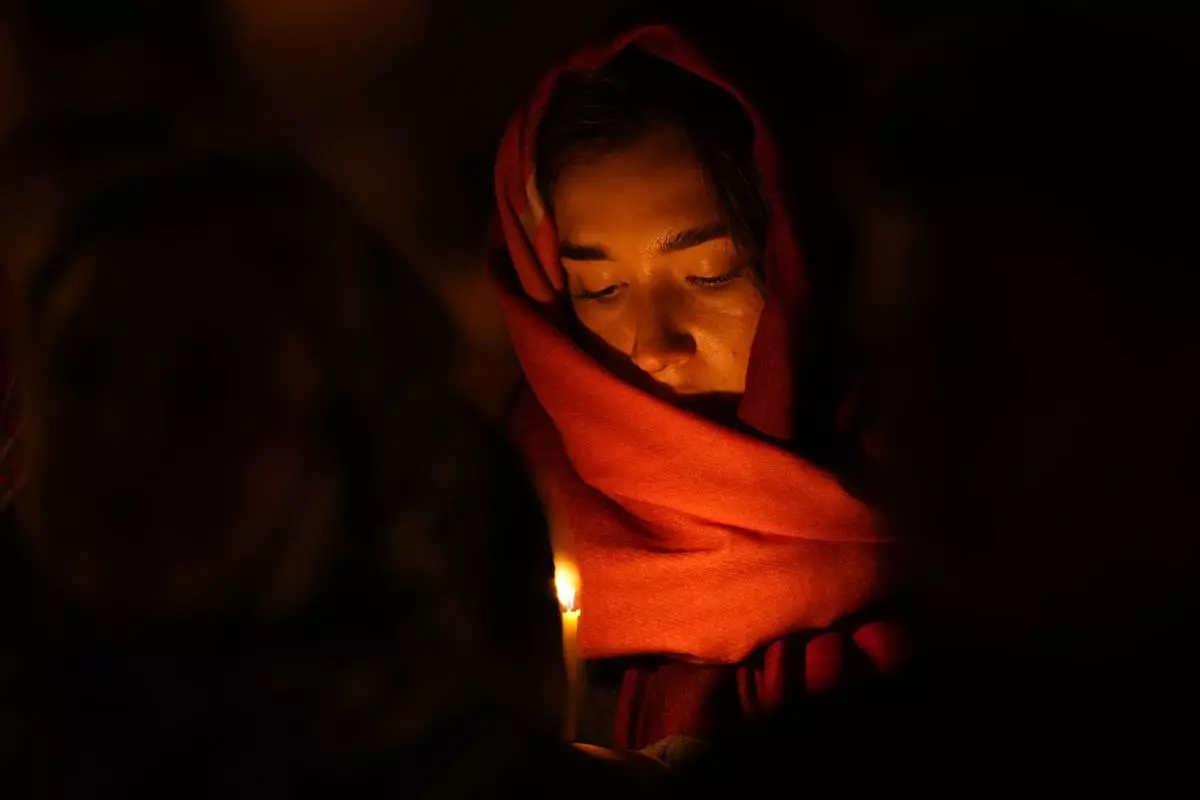
An Orthodox believer looks at her candle during Orthodox Easter midnight service at a church in St. Petersburg, Russia, Sunday, May 5, 2024. Eastern Orthodox churches observe the ancient Julian calendar and this year celebrate Orthodox Easter on May 5. (AP Photo/Dmitri Lovetsky)
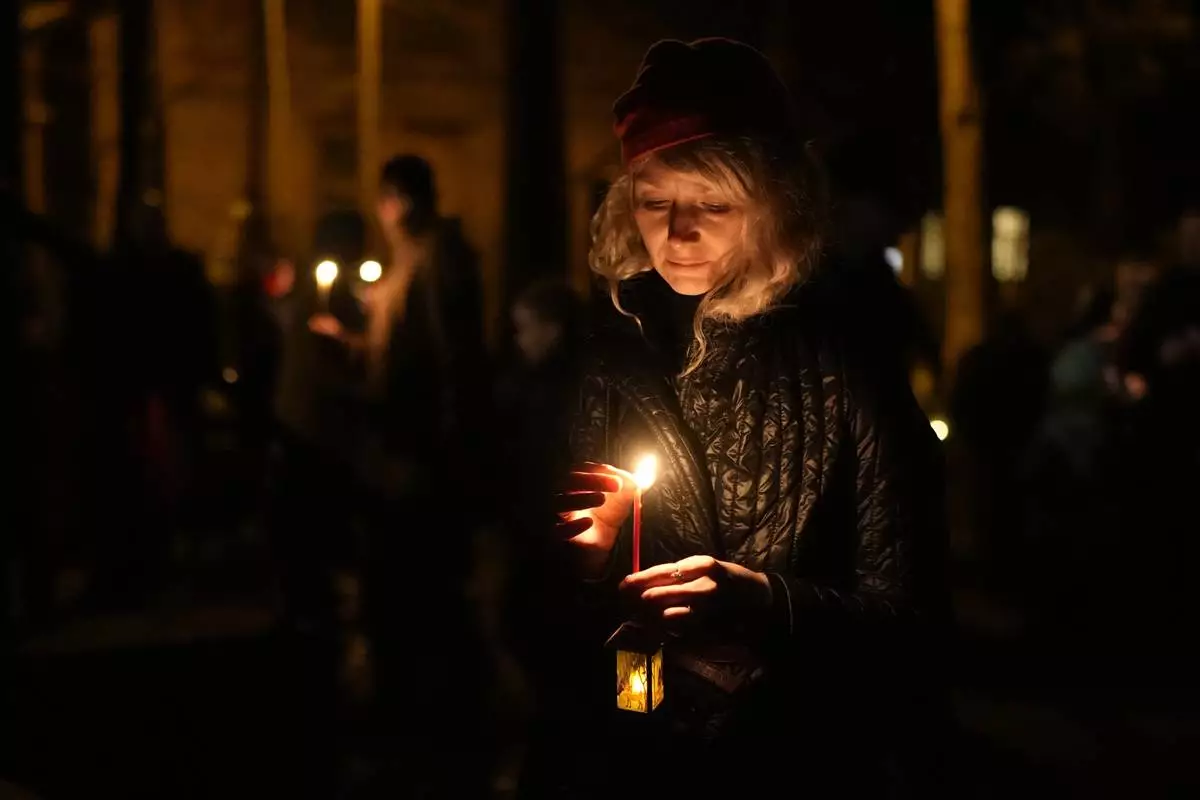
An Orthodox believer puts out her candle after Orthodox Easter midnight service at a church in St. Petersburg, Russia, Sunday, May 5, 2024. Eastern Orthodox churches observe the ancient Julian calendar and this year celebrate Orthodox Easter on May 5. (AP Photo/Dmitri Lovetsky)
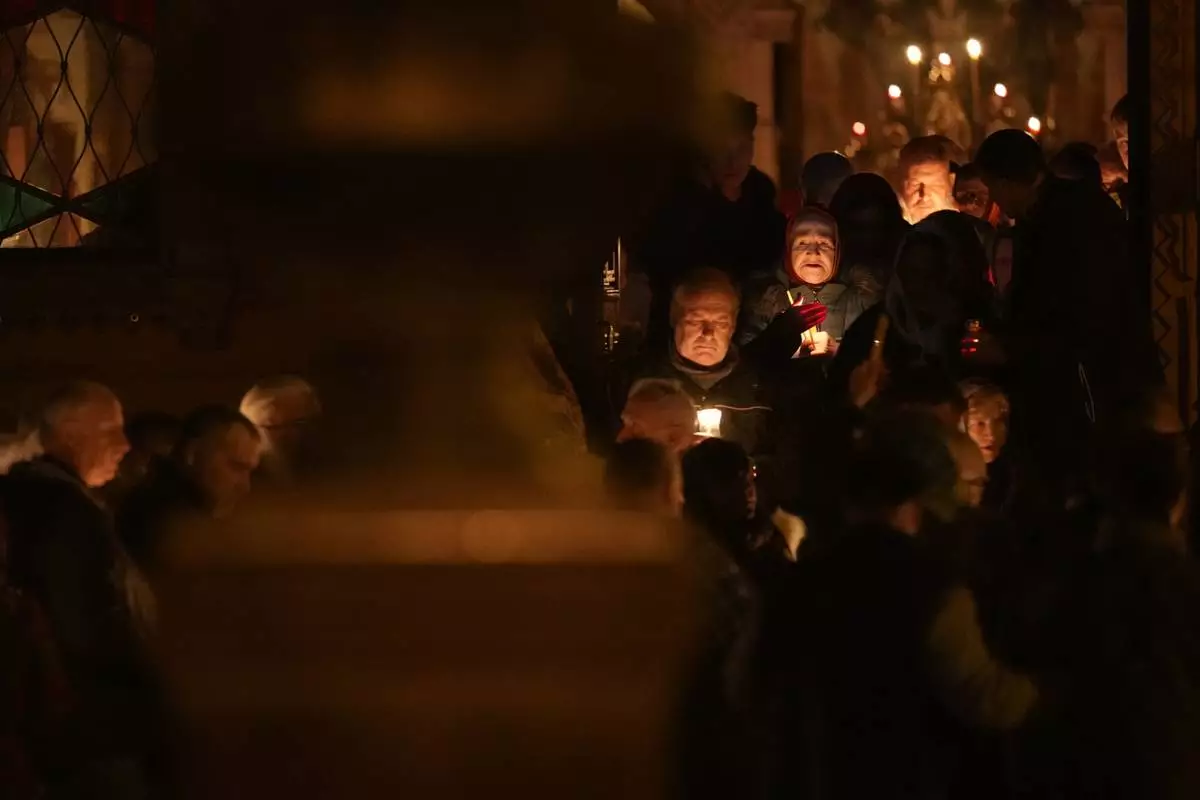
Orthodox believers walk with candles around a church during Orthodox Easter midnight service in St. Petersburg, Russia, Sunday, May 5, 2024. Eastern Orthodox churches observe the ancient Julian calendar and this year celebrate Orthodox Easter on May 5. (AP Photo/Dmitri Lovetsky)
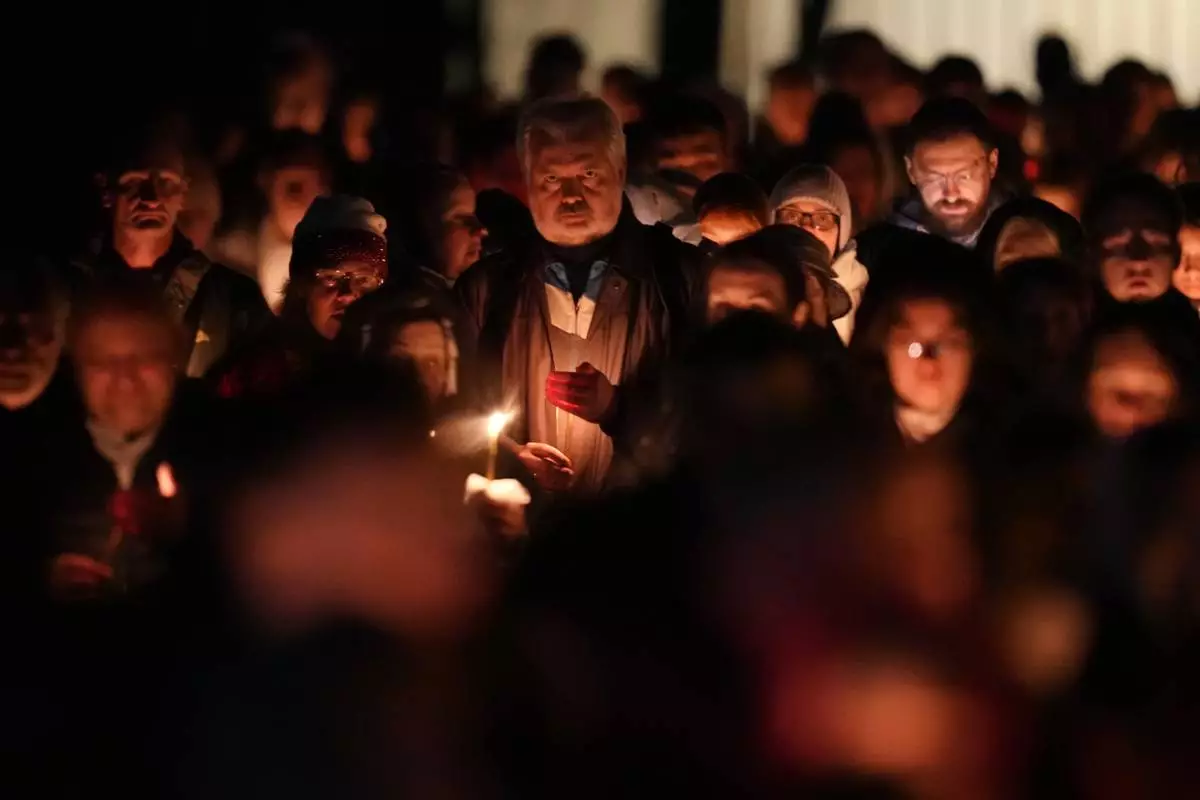
Orthodox believers walk with candles around a church during Orthodox Easter midnight service in St. Petersburg, Russia, Sunday, May 5, 2024. Eastern Orthodox churches observe the ancient Julian calendar and this year celebrate Orthodox Easter on May 5. (AP Photo/Dmitri Lovetsky)
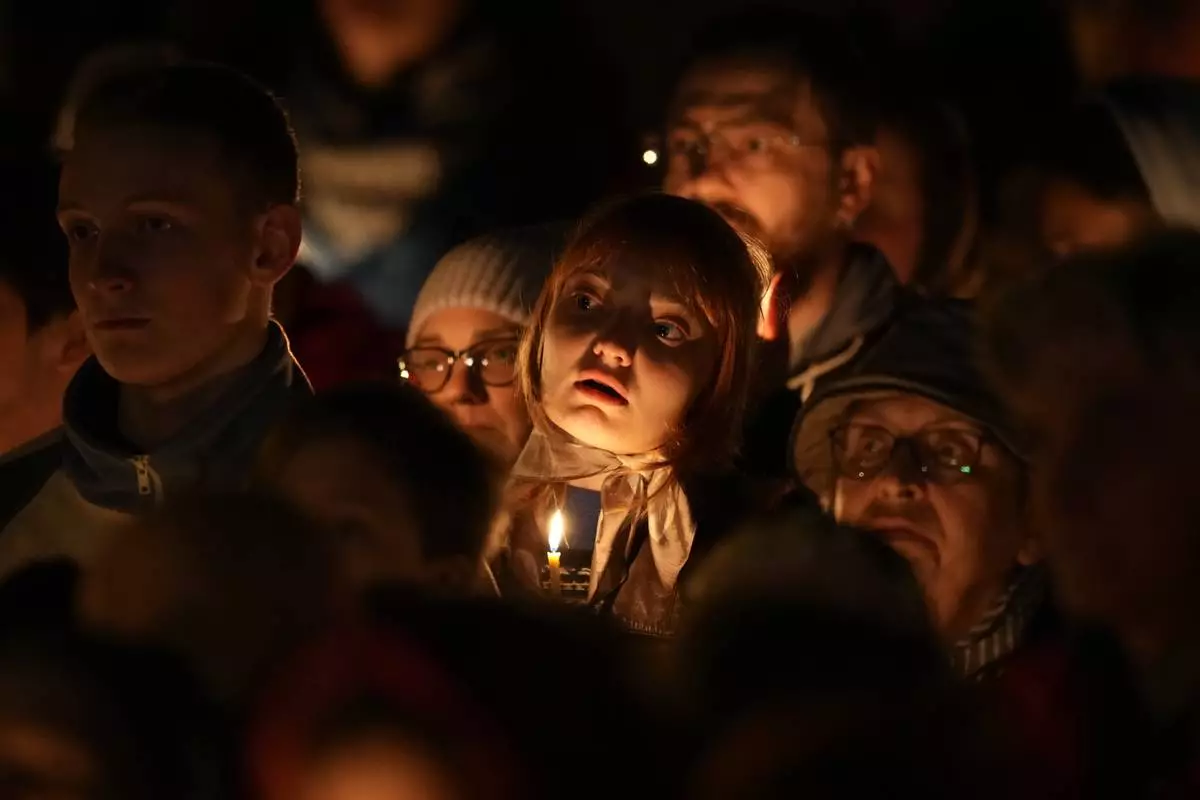
Orthodox believers walk with candles around a church during Orthodox Easter midnight service in St. Petersburg, Russia, Sunday, May 5, 2024. Eastern Orthodox churches observe the ancient Julian calendar and this year celebrate Orthodox Easter on May 5. (AP Photo/Dmitri Lovetsky)
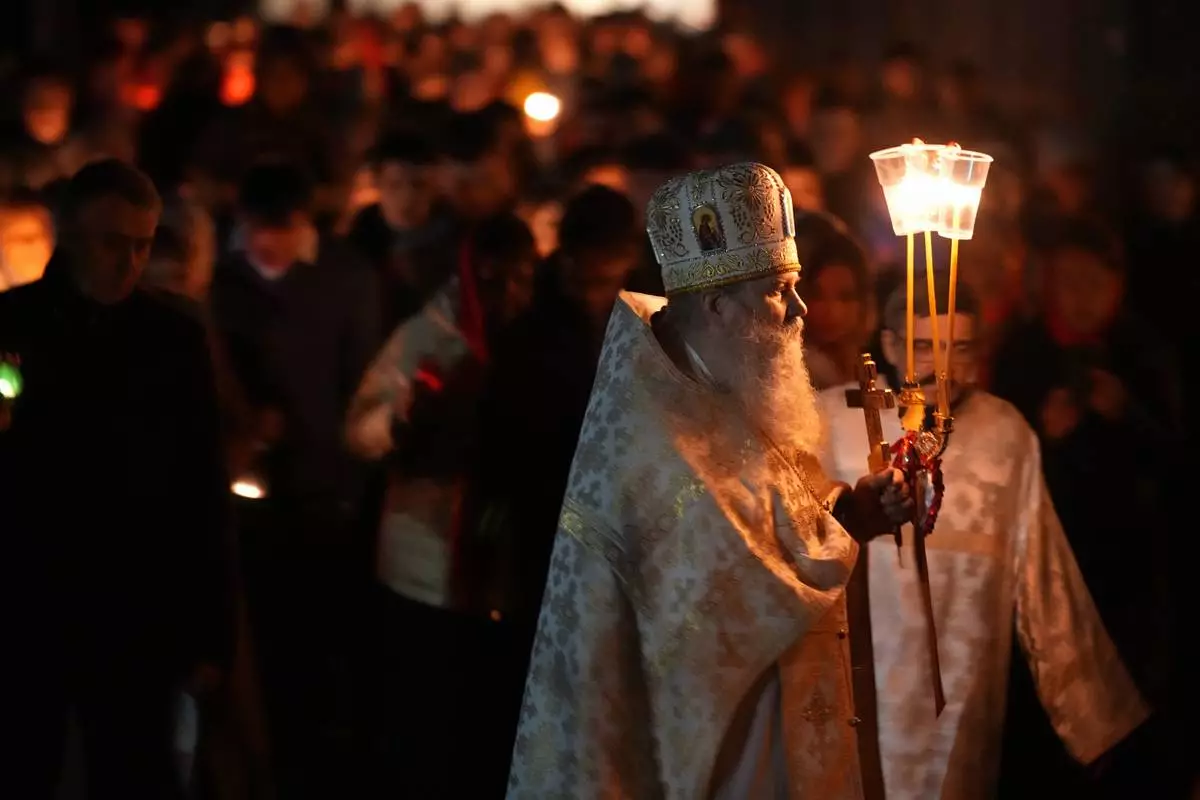
Orthodox pries and believers walk with candles around a church during Orthodox Easter midnight service in St. Petersburg, Russia, Sunday, May 5, 2024. Eastern Orthodox churches observe the ancient Julian calendar and this year celebrate Orthodox Easter on May 5. (AP Photo/Dmitri Lovetsky)

Russian President Vladimir Putin attends the Orthodox Easter service at the Cathedral of Christ the Saviour in Moscow, Russia, Sunday, May 5, 2024. (Pavel Bednyakov, Sputnik, Kremlin Pool Photo via AP)

Russian President Vladimir Putin, left, and Moscow Mayor Sergei Sobyanin attend the Orthodox Easter service at the Cathedral of Christ the Saviour in Moscow, Russia, Sunday, May 5, 2024. (Pavel Bednyakov, Sputnik, Kremlin Pool Photo via AP)

Russian President Vladimir Putin attends the Orthodox Easter service at the Cathedral of Christ the Saviour in Moscow, Russia, Sunday, May 5, 2024. (Pavel Bednyakov, Sputnik, Kremlin Pool Photo via AP)
ATLANTA (AP) — A pregnant woman in Georgia who was declared brain dead after a medical emergency has been on life support for three months to let the fetus grow enough to be delivered, a move her family says a hospital told them was required under the state's strict anti-abortion law.
With her due date still more than three months away, it could be one of the longest such pregnancies. Her family is upset that Georgia’s law that restricts abortion once cardiac activity is detected doesn’t allow relatives to have a say in whether a pregnant woman is kept on life support.
Georgia’s so-called “heartbeat law” is among the restrictive abortion statutes that have been put in place in many conservative states since the Supreme Court overturned Roe v. Wade three years ago.
Adriana Smith, a 30-year-old mother and nurse, was declared brain-dead — meaning she is legally dead — in February, her mother, April Newkirk, told Atlanta TV station WXIA.
Newkirk said her daughter had intense headaches more than three months ago and went to Atlanta's Northside Hospital, where she received medication and was released. The next morning, her boyfriend woke to her gasping for air and called 911. Emory University Hospital determined she had blood clots in her brain and she was declared brain-dead.
Newkirk said Smith is now 21 weeks pregnant. Removing breathing tubes and other life-saving devices would likely kill the fetus.
Northside did not respond to a request for comment Thursday. Emory Healthcare said it could not comment on an individual case because of privacy rules, but released a statement saying it “uses consensus from clinical experts, medical literature, and legal guidance to support our providers as they make individualized treatment recommendations in compliance with Georgia’s abortion laws and all other applicable laws. Our top priorities continue to be the safety and wellbeing of the patients we serve.”
Smith's family says Emory doctors have told them they are not allowed to stop or remove the devices that are keeping her breathing because state law bans abortion after cardiac activity can be detected — generally around six weeks into pregnancy.
The law was adopted in 2019 but not enforced until after Roe v. Wade was overturned in the 2022 Dobbs v. Jackson Women’s Health Organization ruling, opening the door to state abortion bans. Twelve states are enforcing bans on abortion at all stages of pregnancy and three others have bans like Georgia's that kick in after about six weeks.
Like the others, Georgia's ban includes an exception if an abortion is necessary to maintain the woman's life. Those exceptions have been at the heart of legal and political questions, including a major Texas Supreme Court ruling last year that found the ban there applies even when there are major pregnancy complications.
Smith's family, including her five-year-old son, still visit her in the hospital.
Newkirk told WXIA that doctors told the family that the fetus has fluid on the brain and that they're concerned about his health.
“She’s pregnant with my grandson. But he may be blind, may not be able to walk, may not survive once he’s born,” Newkirk said. She has not said whether the family wants Smith removed from life support.
Monica Simpson, executive director of SisterSong, the lead plaintiff in a lawsuit challenging Georgia’s abortion law, said the situation is problematic.
"Her family deserved the right to have decision-making power about her medical decisions,” Simpson said in a statement. “Instead, they have endured over 90 days of retraumatization, expensive medical costs, and the cruelty of being unable to resolve and move toward healing.”
Thaddeus Pope, a bioethicist and lawyer at Mitchell Hamline School of Law in St. Paul, Minnesota, said while a few states have laws that specifically limit removing treatment from a pregnant woman who is alive but incapacitated, or brain dead, Georgia isn't one of them.
“Removing the woman's mechanical ventilation or other support would not constitute an abortion,” he said. “Continued treatment is not legally required.”
Lois Shepherd, a bioethicist and law professor at the University of Virginia, also said she does not believe life support is legally required in this case.
But she said whether a state could insist Smith remains on life support is uncertain since the overturning of Roe, which found that fetuses do not have the rights of people.
“Pre-Dobbs, a fetus didn’t have any rights,” Shepherd said. “And the state’s interest in fetal life could not be so strong as to overcome other important rights, but now we don’t know.”
The situation echoes a case in Texas more than a decade ago when a brain-dead woman was kept on life support for about two months because she was pregnant. A judge eventually ruled that the hospital was misapplying state law, and life support was removed.
Brain death in pregnancy is rare. Even rarer still are cases in which doctors aim to prolong the pregnancy after a woman is declared brain-dead.
“It’s a very complex situation, obviously, not only ethically but also medically,” said Dr. Vincenzo Berghella, director of maternal fetal medicine at Thomas Jefferson University in Philadelphia.
A 2021 review that Berghella co-authored scoured medical literature going back decades for cases in which doctors declared a woman brain-dead and aimed to prolong her pregnancy. It found 35.
Of those, 27 resulted in a live birth, the majority either immediately declared healthy or with normal follow-up tests. But Berghella also cautioned that the Georgia case was much more difficult because the pregnancy was less far along when the woman was declared brain dead. In the 35 cases he studied, doctors were able to prolong the pregnancy by an average of just seven weeks before complications forced them to intervene.
“It’ s just hard to keep the mother out of infection, out of cardiac failure,” he said.
Berghella also found a case from Germany that resulted in a live birth when the woman was declared brain dead at nine weeks of pregnancy — about as far along as Smith was when she died.
Georgia's law confers personhood on a fetus. Those who favor personhood say fertilized eggs, embryos and fetuses should be considered people with the same rights as those already born.
Georgia state Sen. Ed Setzler, a Republican who sponsored the 2019 law, said he supported Emory’s interpretation.
“I think it is completely appropriate that the hospital do what they can to save the life of the child,” Setzler said. “I think this is an unusual circumstance, but I think it highlights the value of innocent human life. I think the hospital is acting appropriately.”
Setzler said he believes it is sometimes acceptable to remove life support from someone who is brain dead, but that the law is “an appropriate check” because the mother is pregnant. He said Smith's relatives have “good choices,” including keeping the child or offering it for adoption.
Georgia’s abortion ban has been in the spotlight before.
Last year, ProPublica reported that two Georgia women died after they did not get proper medical treatment for complications from taking abortion pills. The stories of Amber Thurman and Candi Miller entered into the presidential race, with Democrat Kamala Harris saying the deaths were the result of the abortion bans that went into effect in Georgia and elsewhere after Dobbs.
Mulvihill reported from Cherry Hill, New Jersey. Associated Press journalists Lisa Baumann, Kate Brumback, Sudhin Thanawala, Sharon Johnson and Charlotte Kramon contributed.

Emory University Hospital Midtown is seen on Thursday, May 15, 2025, in Atlanta. (AP Photo/Brynn Anderson)

Emory University Hospital Midtown is seen on Thursday, May 15, 2025, in Atlanta. (AP Photo/Brynn Anderson)

Emory University Hospital Midtown is seen on Thursday, May 15, 2025, in Atlanta. (AP Photo/Brynn Anderson)

Emory University Hospital Midtown is seen on Thursday, May 15, 2025, in Atlanta. (AP Photo/Brynn Anderson)

FILE - The Georgia State Capitol is seen from Liberty Plaza in downtown Atlanta, April 6, 2020. (Alyssa Pointer/Atlanta Journal-Constitution via AP, File)











































































